Chris Baty's Blog, page 27
February 11, 2022
🚨 Project for Awesome Submissions Now Open! 🚨
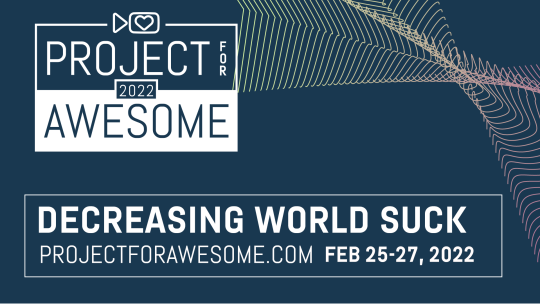 Do you like NaNoWriMo? Do you like making videos? Here’s an easy way you can help support our non-profit!
Do you like NaNoWriMo? Do you like making videos? Here’s an easy way you can help support our non-profit! Project for Awesome is an annual fundraiser run by the Vlog Brothers where people make videos supporting organizations they love and vote on their favorite videos. The organizations with the most votes get a significant grant to help them continue their programs!
Video submissions are open from now until 9 AM EST on WEDNESDAY, FEBRUARY 23. To submit, all you have to do is film a short (2-4 minute) video about why you love NaNoWriMo, upload it as a public video to your YouTube channel, and submit the URL here:
https://www.projectforawesome.com/submit
Have questions? Check out the P4A about page and FAQ!
If you want to take a look at past NaNoWriMo P4A videos, you can see them all here.
February 8, 2022
Facing the Monster of Self-Doubt

It takes many different forms, but every writer faces the monster of self-doubt at some point. Today, writer Ellie Joy shares her encounter with the dreaded beast, and shares some encouragement for facing and moving past that doubt:
“Me? A writer? I’m not experienced enough, old enough, creative enough.”
I don’t know about you, but I’ve thought these same lines too many times. The end of my sentence differs, but the result of the words are still the same. Have you ever heard the saying that you are your own worst enemy? It’s so true.
As an aspiring author, I want to write something worth remembering. Ever since that fateful day when I sat down to write my first story, I knew this was my dream. Never mind that I wasn’t even eight. For that year, I was convinced I practically was an author.
But as I got older, things began to change. My stories no longer seemed impressive to me, and uncertainty began to cloud the dreams of what I aimed my future toward. A wisp of doubt took hold at the back of my mind.
Okay, I’ll share a little more backstory and get more personal. The biggest doubts didn’t just appear overnight.
It was the year 2020, already a year of change (whether we asked for it or not!) and I had decided to undertake my biggest challenge yet—NaNoWriMo. Starting in November, I poured my heart onto the pages and gradually saw the characters, which once only existed in my imagination, come to life on the pages.
If I had succeeded in my goal, this story would be pointless, but I didn’t come close to succeeding. I celebrated my accomplishments but soon thoughts started nagging me. The monster of self-doubt began to prowl. I had begun to realize just how far away I was from the goal and I didn’t like it. At all.
Fast forward a year: I’d written a lot, but just when November rolled around, I quit the novel I’d been working on. Perhaps it was the failed novel, or perhaps it was just hormones, but suddenly the monster that had become more apparent over the year growled lies that spread like a hot ember in a dry forest. Fast. Overpowering.
Until the monster roared, I had been looking forward to trying NaNoWriMo again. But then? I wasn’t sure.
After lots of encouragement from my personal cheerleaders, I reluctantly started the challenge with a hastily planned novel.
At first, just getting to start on a new story was exhilarating, and was to me what coffee is to a lot of people—energy giving. For about a week, the monster was silenced, locked in a cage.
The the middle of the month came and the early mornings and hurried writing started to seem like chores. What had I been thinking, signing myself up for these tiresome days? Suddenly, the goal seemed too far away, my mind too tired, and my fingers not fast enough. Quitting seemed the best option.
“I just can’t do it,” I remember telling my mom after an especially bad writing session. The words in my head were different from the ones that came out of my mouth, though. I’m just not enough. Suddenly, my worth came from my word count that had started to go downhill.
“You should fight against selling yourself short as a writer.“Somehow, I persevered. The word counts piled up and on the last day, I typed my 50,000th word. I cannot express my shock after tallying up the words. I was beyond surprised and so happy. The biggest grin was stuck on my face the rest of the week.
But I’m still human. I still struggle through things, so even though it pains me to admit it…. Conquering that challenge may have shut the monster’s jaws but they soon became unhinged again.
Ironic as it is, as I’m sitting here, staring at this glowing screen, I’m dissing myself. Thoughts keep repeating in my head like the chorus to a bad song: You’re not qualified to write this! Quit before you embarrass yourself.
Which is completely ironic because the topic of this whole post, simply put, is about why you should fight against selling yourself short as a writer.
Isn’t it so hard though? You get in that mindset and it’s hard to take yourself out of it. I personally know how depressing it can be. When I fail at something, I call myself a failure. When I’m really bad at something, suddenly it defines me. Am I the only one? Nope!
Although I can’t tell you exactly how to rid yourself of the monster—I’m still learning myself—I beg you to try to get rid of it. It is worth the effort!
I’ve already missed out on too much because I let the lies define me. NaNoWriMo, my greatest accomplishment? Never would have happened if I had admitted defeat (and if my people hadn’t encouraged me as much as they did). So I implore you, try. Don’t listen to the lies that the monster feeds you about your value—they’re just slippery words. So what if your book has been turned down by publisher after publisher? So what if you’re old enough to get the senior discount at the coffee shop and you still haven’t published? Don’t believe the lies!!!!
You got this. If writing is something you love to do, don’t put it down just because you think that it isn’t good enough! If you get nothing else from this post, please get this; your words matter. You matter. Shut up that monster…
And step into a life with more self-love, because you are worth it.
Ellie Joy is an aspiring author who asks for notebooks as presents and has pencil stains on her pillow from late night story inspirations. As a self-proclaimed nerd, she loves devouring book series and hanging out with friends. After her first NaNoWriMo win, she has begun to fully embrace her writing and continues working on what has been her goal since she started: to publish her first novel.
Top photo by Vlad Zaytsev on Unsplash.
February 3, 2022
Did you read all our Pep Talks last year? Although we’re past...
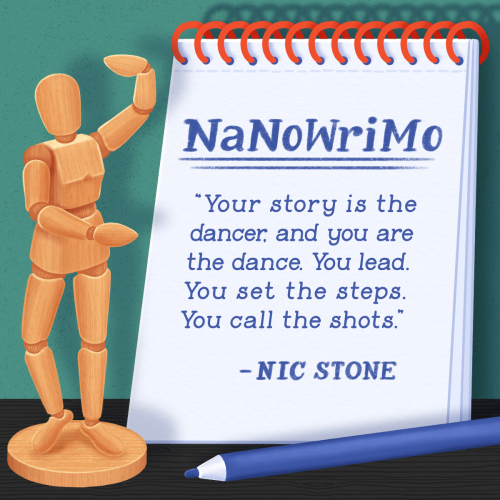
Did you read all our Pep Talks last year? Although we’re past November, author Nic Stone’s Pep Talk is still full of excellent writing wisdom. Read the full Pep Talk here!
Image description: A illustration of a wooden posable drawing model that looks like it’s dancing, in front of a notebook page and blue pencil, with the text: “NaNoWriMo: “Your story is the dancer, and you are the dance. You lead. You set the steps. You call the shots.” —Nic Stone”
Nic Stone was born and raised in a suburb of Atlanta, GA, and the only thing she loves more than an adventure is a good story about one. After graduating from Spelman College, she worked extensively in teen mentoring and lived in Israel for a few years before returning to the US to write full-time. Growing up with a wide range of cultures, religions, and backgrounds, Stone strives to bring these diverse voices and stories to her work.
You can find her goofing off and/or fangirling over her adorable little family on most social media platforms.
February 1, 2022
Writing Fanfiction: Tips for Avoiding Common Pitfalls
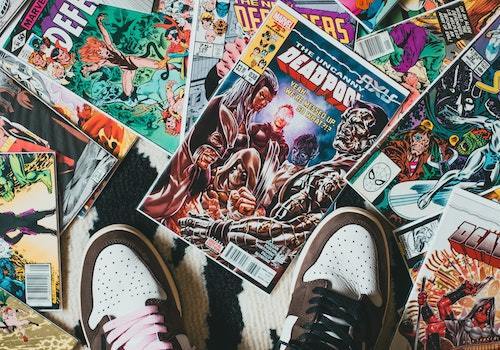
Fanfiction is an often under-rated genre. Tons of authors have honed their writing skills with fanfiction, not to mention the millions of writers and readers who love exploring familiar stories and characters! Today, NaNoWriMo participant Villie V. Kokko has a few tips for making fanfiction writing shine:
Fanfiction is a popular form of writing and one of the recognized genres for novels on NaNoWriMo. Yet, it’s also stereotyped as an inferior—some might call it silly—form of writing. While denigrating any genre as a whole is never a good idea, there are some common patterns in fanfiction that may contribute to this stereotype.
Of course, one of the popular stereotypes is that fanfiction is full of “Mary Sues”: overpowered, supposedly awesome self-insertion wish-fulfillment characters. I’ll skip that familiar topic and dive a little deeper into what’s behind it and what other fanfiction tropes can appear for similar reasons.
1. Give your characters some depth.Fanfiction is almost by definition created by people who were touched by the original work enough to want to build something more out of its foundation. This can be a great fount for good story ideas: what if, what next, what about this character’s unexplored story, etc.
However, the writer’s personal love/hatred/whatever for the original story and characters can also lead to stories that are rather subjective. If you’re motivated by your strong feelings about a particular character, say, it may affect your writing them and others as fully rounded characters. A disliked character might be shown as one-dimensionally negative, a loved character as so loved by others that it’s not logical.
None of this is automatically bad by definition. Palpatine in Star Wars is one-dimensionally evil with style, leaving the hidden nuance and backstory for Darth Vader. Hilarious humorous stories may be built around characters reacting to another unrealistically.
However, it’s a good starting point to write your characters realistically. A story that doesn’t do that, and hasn’t carefully considered why not, may feel off to most readers.
2. Include elements that make your story’s plot interesting.There’s a more general phenomenon behind this that may turn people off to a lot of fanfiction. The writer is so often writing what they want to happen—maybe because of how they feel about the characters or some other aspect of the story, but not necessarily because it will make a compelling story. This is why wish-fulfillment, while not inherently bad, can be seen as something to be avoided: it may sacrifice other aspects of the story. It’s the opposite of being ready to “kill your darlings.”
3. Try something new!Another consequence of this is that fanfiction writers may write a lot of the same kind of story—which others might get bored with sooner rather than later. Fanfiction communities may also collectively prefer kinds of stories and tropes that seem repetitive from an outside perspective.
4. Write what makes you happy.All of that said… it’s fine to do whatever you like.
There’s absolutely no rule saying you can’t do this or that, and don’t let anyone tell you otherwise. If you’d enjoy writing a total wish-fulfillment story, go for it. Even if it’s got a Mary Sue. The reward that you (and maybe a bunch of other fans, too) will like it is reason enough.
I would be hypocritical of me to offer any other kind of advice, anyway. In 2021, I wrote fanfiction for NaNoWriMo for the first time. And it was based on a work where one of the central themes is that anything that makes someone happy is valuable. I was even working on a sequel that makes the ending happier for the characters, even though I think the original ending was just right for the story.
It all depends on what you’re doing. You’re allowed to write for yourself or a particular community. Even if you want to aim for something bigger later, it’s all practice. The only thing is to know what you’re doing. So maybe if you actually want to focus on good characterization, you’ll be careful of some fanfiction tropes that might hinder it. Although, again, nothing automatically does.

Ville V. Kokko is a Ph.D. student and aspiring writer of both fiction and nonfiction living in Turku, Finland. He keeps getting short stuff published in smaller outlets all the time, but is working to make it bigger and publish whole books. He started participating in NaNoWriMo in 2010 and has, separately from that, written a few hundred thousand words of fanfiction. His Goodreads author page can be found here and his general blog here.
Top photo by Erik Mclean on Unsplash.
January 25, 2022
Dialogue 101: Your Go-To Guide for Formatting Dialogue

Some people love writing dialogue, and others find it tricky. What’s the best way to show who’s talking? Where does the punctuation go? Luckily, today, author Annelise Driscoll has some tips for formatting your dialogue:
It’s no secret that formatting dialogue can be a tricky business. From tags to trail-offs to interruptions, there are so many things to consider when you start throwing quotation marks into your stories. But fear not! Formatting your dialogue is easier than it seems.
First of all, it’s important to note that there’s more than one to write compelling dialogue—and whether you use tags, avoid tags, or constantly interrupt your speaker with actions or other characters, each choice you make has a simple formatting solution.
Dialogue TagsWhen it comes to dialogue with tags, there’s only one hard-and-fast rule: Don’t use a period until the end of the sentence. And until you reach the end of the sentence, only capitalize the beginning of the dialogue and proper nouns. It’s also important to note that when it comes to dialogue, question marks and exclamation points often function as commas, so don’t let it throw you off! Only the period denotes the true end of the sentence.
Statements
Correct: “Look at that,” the cat said.
Incorrect: “Look at that.” The cat said.
Incorrect: “Look at that,” The cat said.
Questions and Exclamations
Correct: “Look at that?” the cat asked.
Correct: “Look at that!” the cat cried.
Incorrect: “Look at that?” The cat asked.
Incorrect: “Look at that!” The cat cried.
Additionally, dialogue tags can be used at the beginning of a sentence …
Correct: The cat said, “Look at that.”
Incorrect: The cat said, “look at that.”
… or in the middle of a sentence.
No Dialogue Tags
Correct: “Look,” the cat said, “at that.”
Incorrect: “Look,” the cat said, “At that.”
Incorrect: “Look,” The cat said, “at that.”
Incorrect: “Look.” The cat said. “At that.”
Of course, you might decide you’re sick of seeing “said” and that you would rather avoid tags altogether. If that’s the case, remember the period rule! The period goes at the end of the sentence, which in this case, is the end of the dialogue.
Correct: “Look at that.” The cat peered up into the sky.
Incorrect: “Look at that.” the cat peered up into the sky.
Incorrect: “Look at that,” the cat peered up into the sky.
Incorrect: “Look at that,” The cat peered up into the sky.
Additionally, you may need to find alternative ways to make sure that the speaker is clear. Mostly, you can accomplish this by appropriately separating your paragraphs. In other words, only describe the speaker in the paragraph that contains their dialogue. And always start a new paragraph when a new character begins speaking.
Correct:
“Look at that.” The cat peered up into the sky.
“At what?” The dog followed the cat’s gaze but saw nothing.
Incorrect:
“Look at that.” The cat peered up into the sky. “At what?”
The dog followed the cat’s gaze but saw nothing.
Finally, depending on the tone or length of a character’s dialogue, you may find that you want to split it up, and doing that without using tags requires a bit of finesse … and em dashes.
Correct: “I don’t see”—the dog squinted at the clouds—“anything.”
Incorrect: “I don’t see” the dog squinted at the clouds, “anything.”
Incorrect: “I don’t see.” The dog squinted at the clouds. “Anything.”
Incorrect: “I don’t see”—the dog squinted at the clouds—“Anything.”
And speaking of em dashes, we have a bonus round!
Interrupted Dialogue and “Trail-Offs”Sometimes, characters interrupt one another—or are interrupted by something—and when these sudden interruptions happen, we use em dashes.
Correct:
“What do you mean?” the cat demanded. “It’s right there.”
The dog growled, “I’m looking right where you—”
“Not there.” The cat batted him with a paw. “There!”
Incorrect:
“What do you mean?” the cat demanded. “It’s right there.”
The dog growled, “I’m looking right where you.”
“Not there.” The cat batted him with a paw. “There!”
Alternatively, if a character is not suddenly interrupted, but their speech trails off in awe or a lost train of thought, you’ll want to use an ellipsis. The standard format for an ellipsis varies for different publishers, but a space before each dot is generally a good rule of thumb.
Correct:
“I looked where you said, and I just don’t …”
The dog’s eyes widened as the object of interest finally soared into view: a flying pig.
Incorrect:
“I looked where you said, and I just don’t-”
The dog’s eyes widened as the object of interest finally soared into view: a flying pig.
Incorrect:
“I looked where you said, and I just don’t,” the dog’s eyes widened as the object of interest finally soared into view: a flying pig.
In the end, formatting dialogue—while sometimes tricky—is often easier than it seems. And if one method doesn’t feel quite right, there are endless ways to tweak and tune your characters’ voices. For further discussions on dialogue, feel free to check out my 5 Easy Tricks for Writing Believable Dialogue.
Author of the Color Code series, Annelise Driscoll is a graduate of Hamilton College with a degree in Creative Writing and French. She received her M.A.T. in English Education from the State University of New York at Cortland and currently resides in the Finger Lakes Region of New York with her husband. You can find her on Instagram: @annelisedriscollauthor and check out her website. You can also find her books on Amazon, Barnes and Noble, and Indie Bookstores, as well as some signed copies!
Top photo by Matheus Ferrero on Unsplash
January 20, 2022
How to Make Interesting Worldbuilding Choices
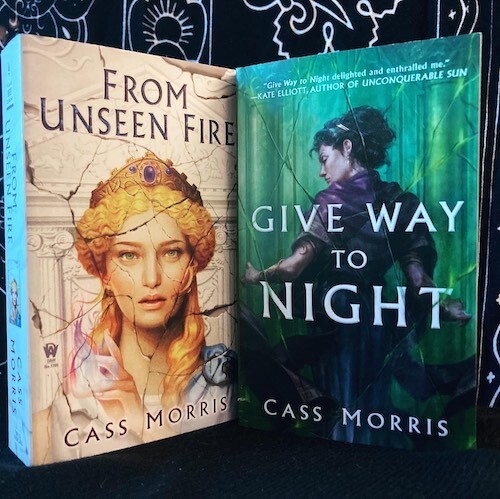
We can’t assume that everyone knows the world we’re talking about, right? Luckily, author and previous Camp NaNoWriMo counselor Cass Morris has a few suggestions to help us more deeply explore our worldbuilding:
One of the most powerful things we can do as writers is create a world. What we write holds a mirror up to reality, where we can examine and criticize our own world or try to build a better one. We get to play god with our characters, and in doing so, we exercise a great deal of power in what we choose to reflect, to magnify, to laud, and to condemn.
So how can we make interesting choices, rather than relying on stale tropes, biased perspectives, or common assumptions about “the way things are” or “the way things were”?
Here are five basic concepts I suggest you explore to develop a richly detailed and unique world:
1. FamilyWhat is a family structure? Is marriage tied to finances, or is it a purely emotional bond? Do you live with your spouse? Do you raise kids together? Is sexual fidelity expected? How many people can be in a marriage? Does “legitimacy” mean anything to family bonds? To inheritance? Is adoption common?
2.Gender & SexualityWhat sexualities are socially permissible? How does your world conceive of gender? Does it accept third genders, nonbinary people, gender fluidity? If your world has rigid gender roles, or if one gender has more power and privilege than the other, make sure that’s a choice you examine, not just something you presume.
3. RaceWhat do race relations and ideas of ethnicity look like in your world? A historical or invented world may conceive identity very differently than we do today. If you have aliens or fantasy races, like elves, dwarves, or goblins, examine them carefully to avoid perpetuating racist stereotypes or erasing real-world issues with a handwave. I recommend Writing the Other as an excellent resource to help you think through these ideas respectfully).
4. The Afterlife and ReligionWhat do your characters believe happens to them when they die? This can affect so much else in a society: how eager or reluctant they are for war, how they preserve assets for future generations, how they conceive of sin and virtue. So what’s your basis? Gods or no gods? Ancestor worship? Natural spirits? And how exclusionary is it? Can your various cults play nice together, or are they trying to wipe each other out?
5. GovernmentWho has power, how do they get it, and how do they hold onto it? There are so many options beyond “ye olde feudalism” and our modern conception of representative republics. Figure out what your structure is, how it came to be that way, and what other beliefs and structures, like religion or the military, it might be tied to.
These basic concepts will touch many other elements of your characters’ lives, from architecture to economy to warfare. They can also help generate wonderful, inventive plot hooks; in making deliberate choices about your world, you may find new challenges and opportunities for your characters.
While worldbuilding is typically associated with fantasy and science fiction, it’s important to real-world genres as well. The world in your book, whether invented or a version of our own, should be as diverse and complex as the world your readers live in. In historical fiction, the challenge is often in distinguishing what “everyone knows” about a period from the lived reality of people during that time. In a modern romance or thriller or anything else, details as small as what someone thinks of as a “normal” lunch can communicate elements of that character’s personal history and the world they operate in.
Make interesting choices. Your readers will be grateful.
 Cass Morris works as a writer and educator in central Virginia. Her debut series, The Aven Cycle, is Roman-flavored historical fantasy released by DAW Books. She is also one-third of the team behind the Hugo Award Finalist podcast Worldbuilding for Masochists. She holds a Master of Letters from Mary Baldwin University and a BA in English and History from the College of William and Mary. She reads voraciously, wears corsets voluntarily, and will beat you at MarioKart. You can find her on Twitter, Instagram, TikTok, and Patreon. Make sure to check out The Aven Cycle and Worldbuilding for Masochists.
Cass Morris works as a writer and educator in central Virginia. Her debut series, The Aven Cycle, is Roman-flavored historical fantasy released by DAW Books. She is also one-third of the team behind the Hugo Award Finalist podcast Worldbuilding for Masochists. She holds a Master of Letters from Mary Baldwin University and a BA in English and History from the College of William and Mary. She reads voraciously, wears corsets voluntarily, and will beat you at MarioKart. You can find her on Twitter, Instagram, TikTok, and Patreon. Make sure to check out The Aven Cycle and Worldbuilding for Masochists.
January 18, 2022
Did you read all our Pep Talks last year? Although we’re past...
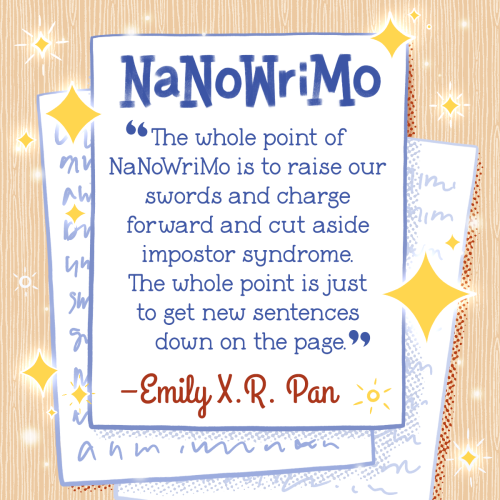
Did you read all our Pep Talks last year? Although we’re past November, author Emily X.R. Pan’s Pep Talk is still full of excellent writing wisdom. Read the full Pep Talk here!
Image description: A illustration of several stacked pieces of paper with yellow sparkles, with the text: “NaNoWriMo: “The whole point of NaNoWriMo is to raise our swords and charge forward and cut aside impostor syndrome. The whole point is just to get new sentences down on the page.” —Emily X.R. Pan”
Emily X.R. Pan is the New York Times bestselling author of The Astonishing Color of After, which was a finalist for the LA Times Book Prize, longlisted for the Carnegie Medal, and the recipient of the APALA Honor Award and the Walter Honor Award. The Wall Street Journal named it as one of the top twelve books of the season, and it was featured on over a dozen “Best of 2018″ lists, including ones by NBC News, Entertainment Weekly, BuzzFeed, and Bustle. Pan has been awarded residencies at Djerassi (2017) and Caldera (2019), was the founding editor-in-chief of Bodega Magazine, and is co-creator of FORESHADOW: A Serial YA Anthology. Visit Emily online at exrpan.com, and find her on Twitter and Instagram: @exrpan.
Emily X.R. Pan
January 5, 2022
Happy New Year, Writers! Did you read author Anna-Marie...
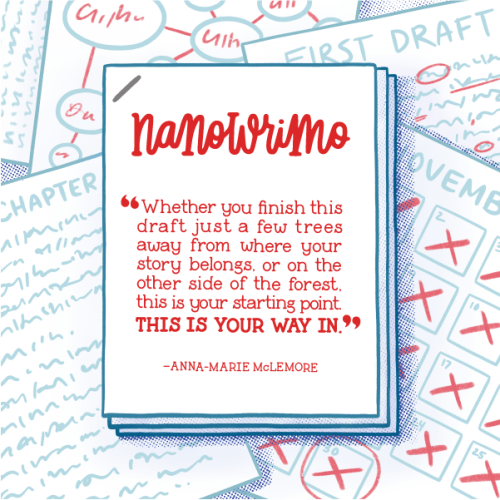
Happy New Year, Writers! Did you read author Anna-Marie McLemore’s Pep Talk this November? It’s a great reminder that finding your way into the first draft of a story is just the beginning. Read the full Pep Talk here!
Sign our pledge to revise your NaNoWriMo novel during our “I Wrote a Novel… Now What?” Months.
Image description: A illustration of lots of scattered pages with blue scribbles and red calendar marks, with a page on top that reads: “NaNoWriMo: “Whether you finish this draft just a few trees away from where your story belongs, or on the other side of the forest, this is your starting point. This is your way in.” —Anna-Marie McLemore”
Anna-Marie McLemore (they/them) is the author of The Weight of Feathers, Stonewall Honor Book When the Moon Was Ours, Wild Beauty, Blanca & Roja, Indie Next List title Dark and Deepest Red, and The Mirror Season, which was recently longlisted for the National Book Award in Young People’s Literature. Lakelore and Self-Made Boys: A Great Gatsby Remix will be released in 2022.
December 22, 2021
Did you read author Michelle Good’s Pep Talk this year? It’s a...

Did you read author Michelle Good’s Pep Talk this year? It’s a great reminder that all your hard writing work is worth it. Read the full Pep Talk here!
Image description: A illustration of an open red book and yellow fountain pen with the text: “NaNoWriMo: “I don’t think writing is ever straightforward. But, when you find yourself having to push harder, work harder, and think harder than you thought would be required when you first sat down to write, do not be discouraged. The more you polish, the more it shines.” —Michelle Good”
Michelle Good is of Cree ancestry, a descendent of the Battle River Cree and a member of the Red Pheasant Cree Nation. She has worked with indigenous organizations since she was a teenager and at forty decided to approach that work in a different way obtaining her law degree from UBC at 43. She has practiced law in the public and private sector since then, primarily advocating for Residential School Survivors.
She graduated from UBC with a Master of Fine Arts Degree in Creative Writing MFA in 2014, where her novel Five Little Indians first started taking shape. Her poetry, and short stories have appeared in a number of publications. Her first novel, Five Little Indians, won the HarperCollins/UBC Best New Fiction Prize and her poetry has been included in Best Canadian Poetry in Canada 2016 and Best of the Best Canadian Poetry in Canada 2017. Michelle is currently working on her second novel.
December 16, 2021
Even though we’re past November, Tracy Deonn’s Pep Talk this...
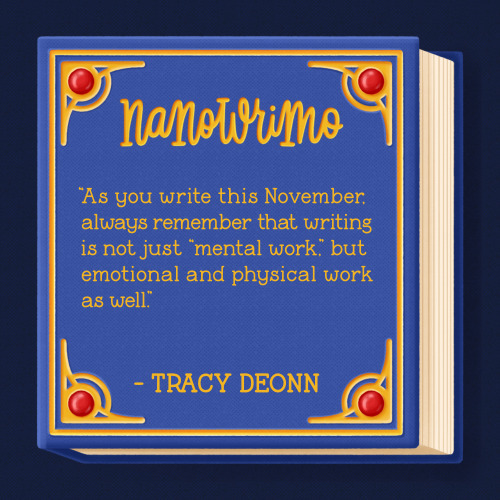
Even though we’re past November, Tracy Deonn’s Pep Talk this year is still full of excellent writing wisdom. Read the full Pep Talk here!
Image description: A illustration of a blue book with red and gold trim with the text: “NaNoWriMo: “As you write this November, always remember that writing is not just ‘mental work,’ but emotional and physical work as well.” —Tracy Deonn”
Tracy Deonn is the New York Times bestselling and Coretta Scott King-John Steptoe Award winning author of Legendborn, and a second-generation fangirl. She grew up in central North Carolina, where she devoured fantasy books and Southern food in equal measure. After earning her bachelor’s and master’s degrees in communication and performance studies from the University of North Carolina at Chapel Hill, Tracy worked in live theater, video game production, and K–12 education. When she’s not writing, Tracy speaks on panels at science fiction and fantasy conventions, reads fanfic, arranges puppy playdates, and keeps an eye out for ginger-flavored everything.
Tracy is a champion for diversity and representation in science-fiction and fantasy literature and media. And when Tracy’s mother told her that the women in their family were Black Bene Gesserits, she believed her.
Chris Baty's Blog
- Chris Baty's profile
- 63 followers



